The Russian Return to the Horn of Africa Through the Gate of Eritrea
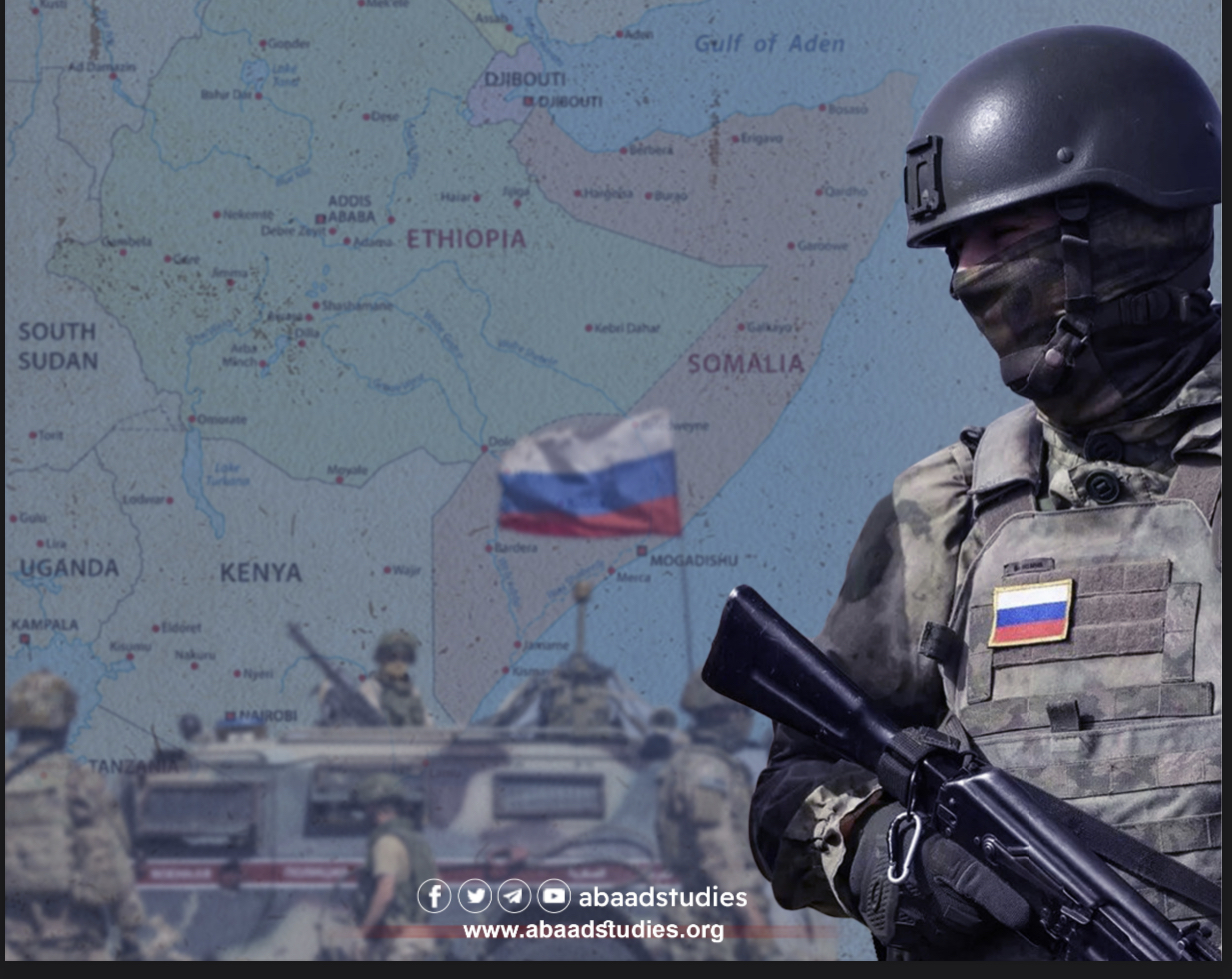
Summary
After a decades-long absence, Russia appears again in Africa. This return has received much attention by the media, governments and civil society. It relies on a set of tools and opportunities, which Russia is trying to translate through many realistic mechanisms through which real influence can be established in Africa.
This study is an attempt to explore the various aspects of Russian-Eritrean cooperation, and the prospects of the Russian return to the Horn of Africa and the Red Sea through the Eritrean gate in light of the similar views of the Russian and Eritrean leaders, especially with regard to building a multipolar world. It also sheds light on the nature of Eritrean-Russian relations, especially after Russia's special military operation in Ukraine (according to the Russian designation).
Introduction
Eritrea is a country in the Horn of Africa. Its capital is Asmara. It is bordered by Sudan to the west, Ethiopia to the south, and Djibouti to the southeast. It has a long coastline on the Red Sea in the eastern and northeastern parts of the country. The country has a total area of approximately 117,600 square kilometers.[1]
In recent years, Russia has shown great interest in Africa in various political and economic fields. It has supported African positions, directed Russian investment institutions to invest in Africa, increased the number of free scholarships for African students in Russian universities, and established many energy projects in Africa. Holding the Second Summit and Russia-Africa Economic and Humanitarian Forum in St. Petersburg last May- in which 49 African countries participated, settling 90% of the debt owed to Russia in favor of many African countries, and sending free shipments of Russian wheat to six African countries, including Eritrea, were clear expressions of this growing interest. In addition, according to Vsevolod Sviridov, an expert at the Center for African Studies, this summit focused mainly on setting political mechanisms for the development of trade and economic relations and was concluded by signing a package of agreements that define the framework for Russian-African relations for the three-year-period up to the next scheduled summit to be held in 2026.
Strengthening partnership mechanisms of the Afro-Russian dialogue, the Russian-African Partnership Forum, and the annual consultation mechanism between the Russian Foreign Minister and the African Union Troika have been prioritized. A consultation mechanism between the Russian Ministry of Foreign Affairs and the Chairperson of the African Union Commission has also been created. The two sides also “started” establishing a high-level dialogue mechanism on security issues. The final declaration recommended enhancing cooperation in the political and legal arenas and in the fields of security, trade, science and culture,[2] and the settlement of trade exchanges in national currencies.
Although the size of Russian influence seems somewhat modest compared to the size of Chinese and Western influence in Africa, recent events in West Africa, from Mali and then Burkina Faso to Niger and Gabon, undoubtedly confirm a significant growth of this influence in the African continent, especially recently. It is also known that the system of international economic relations in a unipolar world puts rather strict political restrictions on participants in the "free market," since most countries are expected to act only within the confines of the system.
For example, Serbia voted in favor of the United Nations General Assembly resolution condemning Russia's war on Ukraine, despite the historical and religious ties between the two countries. Serbian President, Aleksandar Vučić justified Belgrade's support for the UN resolution by saying that it was motivated by concern for Serbia's well-being and because of external pressure. “If we did not vote in the United Nations the way we did, today we would be without 30-50 Western-invested factories and companies that I worked so hard to bring to Serbia," he explained.[3] Eritrea is a country that constantly votes for Russia in the United Nations more often than Syria and Venezuela. One might ask: what motivates Eritrea to do so? Can it gain much for itself by entering into a diplomatic confrontation with the West?
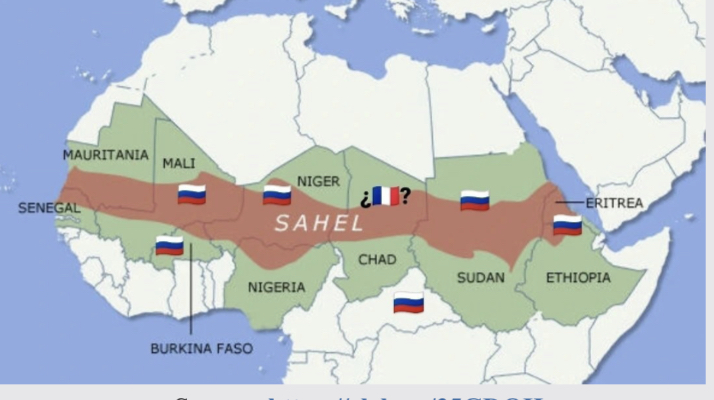
Source: https://clck.ru/35GDQH
According to some Western analysts, French influence in the Sahel region was replaced by Russian influence, except in Chad
A Historical Overview of Eritrean-Russian Relations
On July 28, 2023, the Russian President appointed his assistant, Maxim Oreshkin, as head of the Russian high-level special working group that was formed based on an agreement between Russia and Eritrea. The group would study the possibilities of building trade and economic cooperation between the two countries during Oreshkin's meeting with his Eritrean counterpart at the Russia-Africa Summit in St. Petersburg.[4]
A closer look reveals that diplomatic relations between Russia and Eritrea officially began on May 24, 1993, the day Eritrea declared its independence from Ethiopia. The Russian embassy in the capital, Asmara, was opened in 1994. In 1996, the Eritrean embassy in Moscow was opened. The following year, the two countries signed an agreement on military-technical cooperation, and in 2010, Eritrea began to cautiously build bridges with Russia.
After the annexation of Crimea to Russia, relations between the two countries grew rapidly. Eritrean diplomats were the first to visit the peninsula in 2014. Four years later, Russian Foreign Minister, Sergey Lavrov, announced negotiations on the establishment of a Russian logistics center in one of the strategically important Eritrean ports, in which China was also interested.[5] In January 2017, Russian Foreign Minister, Sergey Lavrov, received his Eritrean counterpart, Osman Salih Muhammad, in Moscow, and then received him again in August 2018 in Sochi.
Mikhail Bogdanov, Special Representative of the President of Russia for the Middle East and Africa, visited Eritrea in 2013, 2018 and 2022. In each visit, he met with President Isaias Afwerki. In addition, consultations between the foreign ministries of the two countries have also been held.
In October 2019, the head of the Eritrean diplomatic corps participated in the Russia-Africa Summit and Economic Forum in Sochi, and in March 2022, Eritrea was one of the five countries (besides Russia, Belarus, Syria, and North Korea) that voted against the UN General Assembly resolution demanding the withdrawal of the Russian Federation forces from Ukraine. In May, Eritrea voted against the United Nations Human Rights Council’s resolution to form a committee to investigate possible human rights violations in Russia’s special military operation in Ukraine.[6] In 2023, the Eritrean President visited Russia twice: the first was to participate in the Russia-Africa Economic and Humanitarian Forum and the second to participate- along with a group of African leaders- in the Russian Navy Fleet Day in Saint Petersburg, in which the Russian President announced an introducing 30 new ships of various categories into service in his country’s fleet,[7] in what seemed to be a clear Russian message to boost the confidence of African partners in the power of his country, which confronts Western hegemony on multiple open fronts.
Russian Attempts to Return to the Horn of Africa and the Red Sea
Western media outlets and research centers believe that what is currently taking place between the West and Moscow is a reproduction of the Cold War and the concomitant competition and struggle over areas of influence. Today, competition takes place among global powers over some strategic regions of the world, especially the Middle East and the Horn of Africa due to the geostrategic importance of these two regions for the interests and policies of major countries. In the midst of this new cold war, some traditional powers will seek to maintain their areas of influence, other countries will seek to obtain new areas of influence, and others still seek to restore their position and influence.[8]
Twenty years ago, Russian diplomacy asserted its presence in the Middle East and the Horn of Africa. Moscow set itself a goal in the context of this “return”– the establishment of a military base on the Red Sea, as was the case in the era of the Soviet Union. Russia's interest in the Red Sea is not new. During the Cold War, Moscow, Washington, London and Paris vied for control of the Middle East and the Horn of Africa. In this context, the Soviet Union sought to establish a permanent military presence in the Arabian Peninsula and the Horn of Africa in order to provide logistical support to its naval operations in the region. In addition, this strategic goal was inconsistent with one of the most important characteristics of the Soviet Union; namely, the lack of a Soviet colonial past in the Middle East. All these difficulties deprived Moscow of gaining a firm foothold in the region, except when a friendly country, such as Ethiopia or South Yemen during the Soviet era, accepted an alliance with it. Such alliances were fragile because they were hostage to the geopolitical fluctuations in this turbulent region. For example, in the 1970s, the Soviet army had a military apparatus for a while in Berbera, the main port of today's Somaliland. This military base was closed at the beginning of the war between Somalia and Ethiopia in 1977, when Moscow clearly sided with Ethiopia, which led to the expulsion of Russian soldiers from Somalia. Then, the collapse of the Soviet Union led to a significant reduction in the Russian presence in Africa and the Middle East, especially following the closure of the Aden base in 1994.
In the mid-2000s, Moscow had the resources and desire to return to the Middle East and the Horn of Africa regions and restore its military presence on the shores of the Red Sea. To secure its return to the Red Sea, Moscow relied less on its soft power than on the attractiveness of its military capabilities and the effectiveness of its security services. The success of Russia's campaign to protect its Syrian allies helped build confidence with Moscow as a guarantor of security, even in countries that were not part of the Soviet Union.[9]
The Secret of Eritrean Support for Russia
Eritreans remember the diplomatic support provided by Russia at the United Nations during the war with Ethiopia. Western countries have repeatedly tried to accuse Eritrea of posing a threat to international security. On December 6, 2011, Russia abstained from voting in the UN Security Council on the sanctions resolution against Eritrea in connection to charges of involvement in the alleged terrorist attack in Addis Ababa, the capital of Ethiopia, during the African Union summit in that city in January 2011. After Asmara's agreement with Addis Ababa, the international community lifted most of the restrictions imposed on Eritrea, but immediately began to reimpose them due to another conflict in Ethiopia, as Eritrea provided support to its former opponent. In August 2021, the United States imposed a new package of sanctions on Eritrea in relation to serious human rights violations in the Tigray region of Ethiopia. But according to observers, Eritrea has become the subject of western diplomatic pressure because of its independent position on foreign policy issues.[10] Since Russia has influence in the international community and is known for using its veto power in the UN Security Council to defend its allies, Eritrea saw in the current geopolitical moment an opportunity to strengthen its relations with Russia to avoid being targeted by upcoming international resolutions. In his conversation with his Russian counterpart, the Eritrean President said, “The West is trying to contain Russia first, and then China at a later stage, and even small countries that do not revolve in the Western orbit. They are trying to contain small Eritrea and punish it with sanctions, but we do not yield to their threats.”[11]
According to observers, Afwerki’s visit to Moscow and his earlier visit to Beijing come in the context of an attempt to break the isolation imposed on his regime, which is suffering due to the effects of the American sanctions imposed on it. Observers also maintain that the latter visit aimed to find Russian alternatives in the fields of economic and trade cooperation, mining and education, in addition to benefiting from Russian military technology to re-modernize and build the Eritrean army which has emerged from a fierce war in the Ethiopian region of Tigray.
The Secret of Russian Interest in Eritrea
The Russian approach to strengthening its relations with Eritrea depends on the fact that the countries of sub-Saharan Africa are characterized by active dynamism, especially as young people constitute the largest proportion of the population of these countries, in addition to economic growth rates which are higher than the global average. These countries are also rich in minerals that are indispensable when talking about establishing modern, high-tech industries in the various sectors. In addition, Eritrea is located on the shores of the Red Sea, and has a developed infrastructure for ports, which facilitates communication with industrial facilities in the country. Russia seems to focus on establishing free industrial zones in Eritrea, similar to those that are being established in Egypt. This will have a lucrative effect as it reduces Russian goods production costs. In the medium term, Eritrea may become a new bridge linking Russia to this important part of the African continent.[12]
In mid-July, the two management boards of Sevastopol on the Black Sea and the port of Massawa on the intersection of the Red Sea and the Indian Ocean agreed to implement the cooperation agreement signed in 2018. According to Eritrea's ambassador to the Russian Federation, Petros Tsegay, the document allows enhancing cooperation between Crimea and his country and intensifying bilateral economic partnership in general. The logistics center to be built in the port of Massawa aims to transship goods to ship them later - within the framework of parallel import and re-exports to the Russian Federation from countries not participating in the sanctions against Russia. This port is also scheduled to be a center for the distribution of export shipments coming from all countries of the Eurasian Economic Union, which will be exported to Eritrea's neighboring countries in northeastern and eastern Africa.[13]
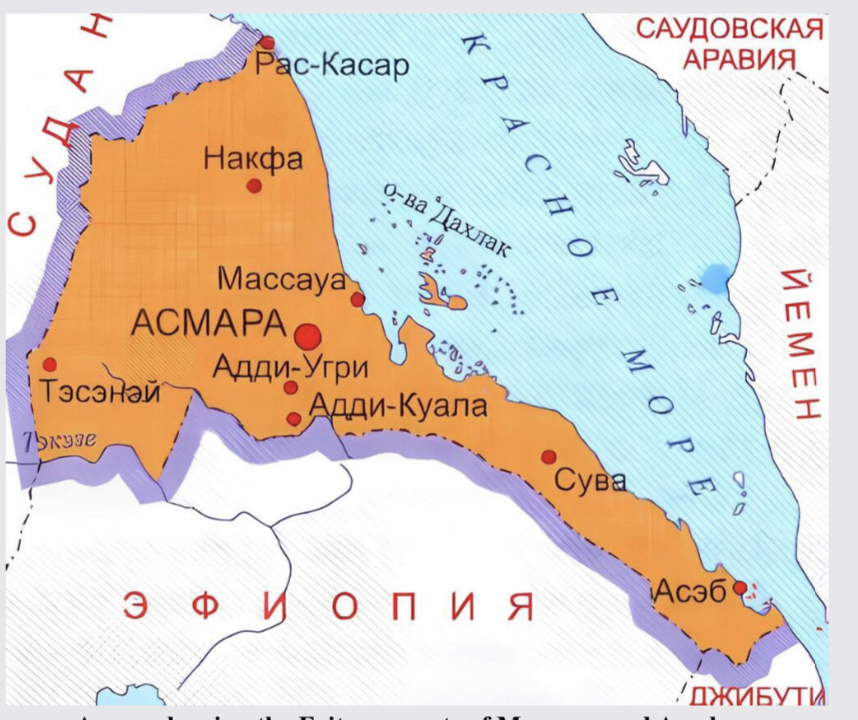
A map showing the Eritrean ports of Massawa and Assab
Source: https://clck.ru/35GEwo
According to Brunel University researcher, Anna Maria Bloy, Russia is competing with China and Western powers for influence in Africa to advance its military and economic interests. To achieve these goals, Russia uses three main methods of payment: arms sales, military aid and energy contracts.
The Red Sea is a strategic area for Russia as 24% of its oil exports to different countries pass through this sea. Therefore, it thought that establishing naval bases on Red Sea coasts could provide it with a foothold in warm waters. It is likely that Russia will establish a naval logistics base in Eritrea in the next five years, followed by investments in infrastructure and the energy sector. It is very likely that Russia will try to enter into a naval competition with China, France and the United States in the Red Sea in order to enhance its position as a global power. To this end, one of Russia's goals is to establish a military base and seaport in Eritrea.
The Eritrean ports of Massawa and Assab occupy strategic points on the Red Sea. Although the stated purpose of the agreement signed between Russia and Eritrea was to stimulate trade and commercial transactions between the two countries, it is likely, according to observers, that it will allow the Russians to gather intelligence on the shipping traffic passing through the Red Sea to the Mediterranean and Arabian Seas. This would include US and Chinese warships leaving the Persian Gulf and the Indian Ocean.
On May 24, 2022, Eritrea organized celebrations to mark the 31st anniversary of independence, during which President Afwerki spoke about the war in Ukraine and defended Russia, blaming the conflict on Western countries. In his speech, the Eritrean leader compared Eritrea's struggle for independence to the current international dynamic, which is driven by what he called "a misinterpretation of the end of the Cold War" by dominant Western elites who believed they could seize a historic opportunity after the collapse of the Soviet-US polarity based on neo-colonial logic.
Afwerki believes that the attempt to contain Russia is manifested by the expansion of Western political and military hegemony in Eastern Europe, and in sacrificing Ukraine as an instrument in a strategy aimed at escalation and conflict. According to the Eritrean president, this is the same strategy adopted by the West to contain China's role in Asia and exploit the dynamics associated with Hong Kong and Taiwan. According to the Africa Times, Afwerki's Eritrea will support the deployment of a Russian naval base on the Red Sea. This confirms the rumors that have been circulating on this subject for some time regarding the trips of the Eritrean Foreign Minister to Moscow and the subsequent bilateral negotiations that followed these visits.[14]
Isaias Afewerki and the American Position
According to the Washington Institute's Fikra Forum, the United States supported Eritrea's independence from Ethiopia in the early 1990s. Relations between the two countries were constructive at first, and Asmara planned to pursue neoliberal economic policies. Washington considered Asmara an important ally because of its strategic location on the Red Sea. To prove its importance, the then commander of US Central Command, General Tommy Franks, visited Eritrea. However, after the border dispute between Eritrea and Ethiopia in 1998, Eritrea's position towards America changed. This was followed by a coup by Eritrean President Isaias Afwerki against the leaders of his party and the arrest and expulsion of a number of military leaders and businessmen, while adopting a nationalist ideology based on suspicion of the foreign countries, which manifested itself in conflicts with neighbors, in addition to describing the United States as the greatest threat to Eritrea.
It was expected that relations between Eritrea and the United States would continue in an upward direction, until the Clinton administration came and changed its strategic alliances in Africa based on a new map in which it ignored Eritrea as an ally, replacing it with Ethiopia as its new ally in East Africa. Eritrean-American relations declined significantly until disputes erupted broke into the open in 2000.
Eritrea's frustration with America's neglect prompted it to launch massive arrest campaigns against Eritreans with links to the American administration. Eritrea did not care about the American and international condemnation of its campaign, so it escalated the matter further by arresting two American citizens of Eritrean origin who were working in the American embassy in Asmara. Understandably, the United States reacted to Eritrea’s actions by depriving Eritrean diplomats of their diplomatic privileges.[15]
After the special Russian military operation in Ukraine, Eritrea's anti-American policy rhetoric escalated. In February 2023, during his interview with Eritrean state television, President Afwerki referred to what he described as "historical facts and outcomes of the new American national security strategy on global and regional peace." He said, “A deep-rooted political culture, based on greed and hegemony by a few has been the main cause of the turmoil and conflicts that have bedeviled the world in recent decades.”[16]
In the Kremlin press statement following the meeting of the Russian and Eritrean presidents on the sidelines of the Africa-Russia Summit in Saint Petersburg, Afwerki renewed his country’s support for Russia in its confrontation with NATO, saying, “When we talk about the situation between Russia and Ukraine, I say, there is no war between Russia and Ukraine. What is happening is nothing but a war declared by NATO against Russia, stressing that this war is not only against Russia, but a war waged by the West against the world for the sake of hegemony. The post-Cold War agenda is represented by the fantasy of containing Russia and indeed any power, big or small, that challenges the West on the cultural, social, technological and political levels.”[17]
It's Not Just About Arms Deals!
According to Ogul Turk, Russia's interest in Africa is not limited to economic or militarization issues, but rather includes humanitarian, peace, education and security issues. For example, Rosatom is part of Russia's limited soft power efforts in Africa. The company funds educational programs in science, technology, engineering and mathematics, including science competitions for high school and college students. It provides African students with scholarships to study in Russia.[18]
The Horn of Africa is rife with local conflicts and political and economic instability, despite being a geopolitically strategic region containing vast natural resources of rare minerals and oil. Therefore, Ogul expects that in the short term, Russian policy will focus on political cooperation, arms sales and investment in natural resources.[19]
The key question is: can Moscow afford the cost of maintaining this return on an ongoing basis, especially in light of the burden of economic and political challenges due to the raging and open geopolitical fronts with the West?
Russian-Eritrean Interests
Russia is one of the top exporters of energy and weapons in the world. According to the annual report issued by the Stockholm International Peace Research Institute (SIPRI) 2020, Russian military exports to Africa represented 18 percent of its total arms exports in the period between 2016 and 2020. Therefore, Eritrea hopes to benefit from the Russian experience in this field to improve its economy and defense. The two countries have begun military cooperation in preparation for establishing a strategic center on the Eritrean coast. As a result of Moscow's limited economic options compared to its main competitors— China, the United States, and the European Union, the military security services market was the most visible aspect of its presence in Africa and a gateway to expanding its geopolitical and economic influence to benefit from Africa.
In this context, there us much talk in the media about Moscow's attempts to build a military base in Africa, especially on the Red Sea coast. The new Russian naval military doctrine signed by Russian President, Vladimir Putin, in July 2022 stated that Russia would establish logistical support points for naval ships in the Red Sea and the Indian Ocean. Former Russian Deputy Prime Minister for Military-Industrial Complex Affairs, Yuri Borisov, confirms that “it is vital for us to build our capabilities to ensure and protect Russian national interests in the high seas,” stressing that the amendment of the naval doctrine took into account the change in the geopolitical and military-strategic situation in the world.[20]
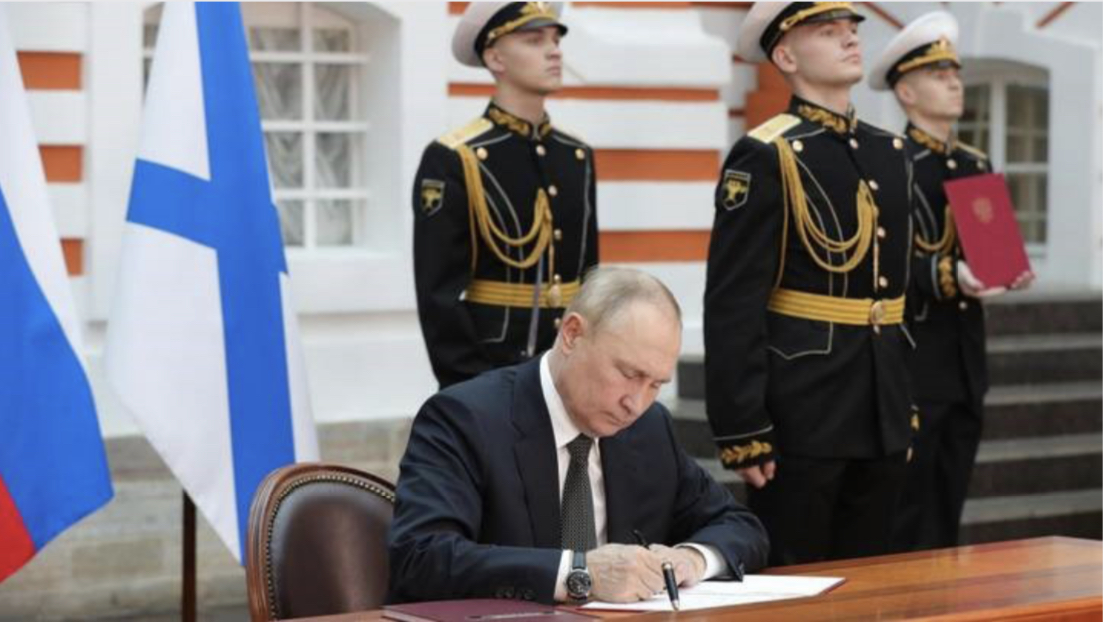
Putin signing the new Russian naval doctrine in July 2022
Source: https://clck.ru/35GE7U
Russia hopes to have a presence in the Red Sea that will allow it to gain a foothold among the major powers competing in the region so that it can play a more important role in the regional arena, and to increase its political influence and status as a major power, as well as establishing a base in the Red Sea that would allow it to collect intelligence information on shipping traffic in that sea. In a press conference after his discussions with his Eritrean counterpart, Osman Saleh, Lavrov stated, “Of the long-term plans that will be studied in detail, I mention the possibility of using the logistical capabilities of the port of Massawa as well as the airport of this city, which raises interest in its capabilities in the field of transit. The Eritrean side is interested in this issue and we are ready to help."
According to African affairs researcher, Ibrahim Idris, the Russian Foreign Minister’s choice of the countries covered in his visit was not a coincidence. In addition to Eritrea, he visited Angola and South Africa. All of these countries “supported Russia’s position in the United Nations and in the international community as a whole.” Eritrea was the only African country that voted against a UN resolution condemning Russia's special military operation in Ukraine.[21]
Advantages of Eritrea's Location for Russia
The location of Eritrea has many advantages. The coast of Eritrea is very close to Bab al-Mandab strait, the southern entrance to the Red Sea and one of the most important waterways in the world. It is also the entry to the Indian Ocean. Moreover, the strait at its narrowest point is only 38 kilometers wide, which means in theory that it is not even necessary to have a fleet there as it would be enough to set up coastal batteries to be able to close this pathway to any ship.
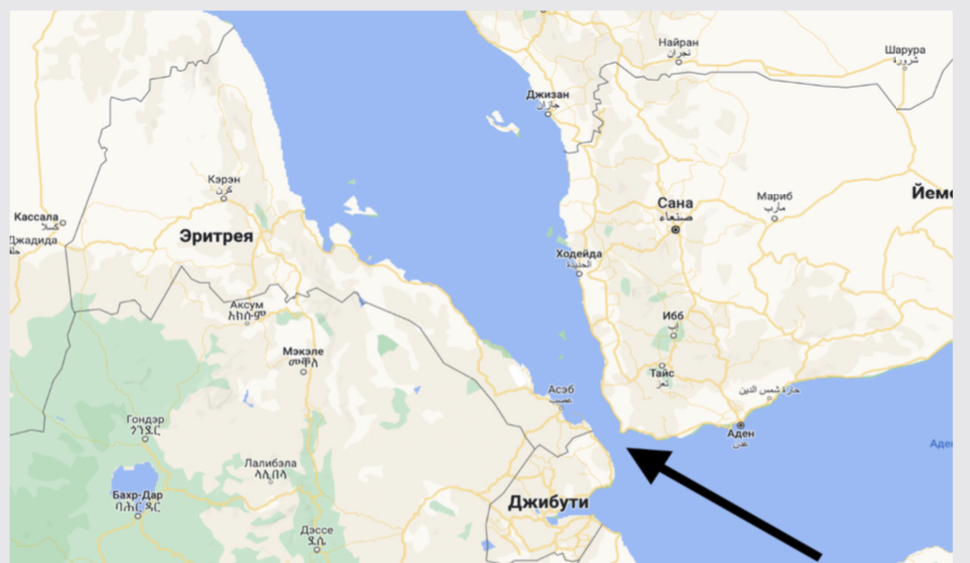
Source: https://dzen.ru/a/ZHeD_5no9TnuT5k
From this vantage point, the naval base in Eritrea would be more interesting than the one in neighboring Sudan, which is being covered by the media.[22]
This important location will also support Russian operations in other parts of the region, creating a platform for intelligence gathering to monitor the activities of American, Chinese, French, Turkish or Japanese forces, as well as Saudi and Emirati forces in and around the Red Sea and the Arabian Peninsula, and the security situation throughout the Horn of Africa. On the other hand, the ruling regime in Eritrea is capable of implementing or imposing any agreement due to the lack of any political opposition or civil society forces capable of holding the government accountable for such decisions.[23]
Conclusion
Why does Russia need Africa? Why does Africa need Russia? It is commonly held that Russia needs Africa to prove that it is not in a state of international isolation as the West imagines and that African countries need Russia to get weapons and strengthen their political systems with the help of Russian security companies. However, reality confirms that Russia is moving in more than one direction and in more than one continent: in Latin America, Asia and elsewhere. In today's world, it is possible to acquire arms from China and even from France. What Russia needs from Africa is that this continent for Russia is a huge and growing market for Russian products and technologies (from grain to nuclear power plants), and an important area of geopolitical influence (military bases, voting in the United Nations). “In light of the state of chaos the international system is going through and regional developments in the Horn of Africa and the Middle East, it seems that the pattern of establishing Russian military bases abroad, especially in vital areas, is one of the most important motives for Russian moves to fill this void, particularly the conflict between Russia and the West. This increases the possibility of Africa turning into a field of conflict between the two parties, which is what is happening now."
Finally, relations between Moscow and Asmara span across a wide range of fields, from weapons to energy, industrial zones, international politics, a shared vision of a new multipolar world, and a common belief in a Western conspiracy against the two countries. The Russian dream project of a foothold on the Red Sea will remain a trump card and “another option” that Asmara is making to maneuver Washington and its allies to ensure the preservation of what it considers the country’s supreme interests, represented by the continuity of the Afwerki regime. When the Eritrean leader feels that these interests are threatened, the ambitions of the Kremlin will be tested on the shores of the warm waters, at the entrance to Bab al-Mandab, close to the most important maritime choke lines and global trade corridors. It can be said that the phase following the special military operation in Ukraine and the Sino-American tensions with regard to Taiwan and the China Sea region reinforced the independence tendency of many countries that reject Western hegemony.
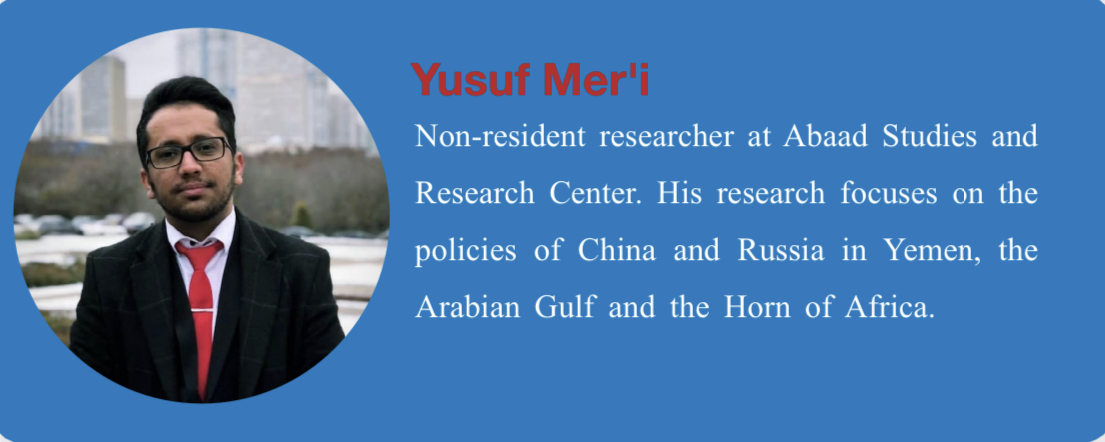
References
[1] Wikipedia, https://clck.ru/348kGY, accessed 07/22/2023
[2] Российский Совет по Международным Делам: овторное знакомство: как Россия и Африка встретились в новых условиях 3 августа 2023 [Электронный ресурс]. – Электрон. дан. Режим Доступа: https://clck.ru/35CNS3 (Дата обращения: 07/03/2023 )
[3] Вучич объяснил поддержку антироссийской резолюции в ООН заботой о Сербии: [Электронный ресурс] // РИА Новости (03/06/2022) – Режим доступа: https://ria.ru/20220306/rezolyutsiya-1776861654.html
[4] Путин рассчитывает на развитие отношений России и Эритреи: [Электронный ресурс]. – Электрон. дан. Режим Доступа: https://clck.ru/359QaH (Дата обращения: 07/30/2023)
[5]Из Африки с любовью: что такое Эритрея и почему она все время поддерживает Россию: [Электронный ресурс] // postnews. (04 МАЯ 2022) – Режим доступа: https://postnews.ru/a/17780 (Дата обращения: 07/26/2023)
[6]Что известно об отношениях России и Эритреи : [Электронный ресурс]. – Электрон. дан. Режим Доступа: https://tass.ru/info/16893295 (Дата обращения: 07/24/2023)
[7] [7] Главный военно-морской парад: kremlin 30 июля 2023 года [Электронный ресурс]. – Электрон. дан. Режим Доступа: http://www.kremlin.ru/events/president/transcripts/71848 (Дата обращения: 07/22/ 2023)
[8] Saleh, Abbas Muhammad. “The Future of Russian Moves in Africa: The Case of The Horn of Africa." Turkish Vision, No. 7 (2), June 2018, p. 173.
[9] Beraik, Alaa. "Eritrea and Russia: The Dialectic of Mutual Interests, Ru'yah News, May 16, 2022, https://clck.ru/348k6c, accessed July 26, 2023.
[10] Российский Совет по Международным Делам: Почему Эритрея поддержала Россию? 18 марта 2022 [Электронный ресурс]. – Электрон. дан. Режим Доступа: https://clck.ru/359xxs (Дата обращения: 07/27/2023)
[11]Встреча с Президентом Эритреи Исайясом Афеворки: kremlin (28.07.2023) [Электронный ресурс]. – Электрон. дан. Режим Доступа: http://www.kremlin.ru/events/president/transcripts/copy/71830 (Дата обращения: 07/30/2023)
[12] Там. Же.
[13] Россия возвращается в Африку: дорогу осилит идущий: fondsk.ru( 29.07.2023) [Электронный ресурс]. – Электрон. дан. Режим Доступа: https://clck.ru/35GDQH (Дата обращения: 08/07/2023)
[14] Abdel Rahman, Suhaib. "The Return of Great Russia Through the Horn of Africa," 07/15/2018. https://clck.ru/348kq6, accessed 07/04/2023
[15] "American-Eritrean Relations: Past, Present and Future," The New Somalia, December 9, 2018. https://clck.ru/34e9pa, accessed 07/20/2023
[16] Bashir, Hamdi. "Afwerki's Ambitions: Why is Tension Between the United States and Eritrea Escalating?" 02/22/2023, 2032 https://clck.ru/34E9SE, accessed 04/04/2023
[17] Встреча с Президентом Эритреи Исайясом Афеворки: kremlin (28.07.2023) [Электронный ресурс]. – Электрон. дан. Режим Доступа: http://www.kremlin.ru/events/president/transcripts/copy/71830 (Дата обращения: 07/30/2023)
[18] Россия возвращается в Африку(31.08.2022). [Электронный ресурс]. – Электрон. дан. Режим Доступа: https://dzen.ru/a/Yw-HUiaO7QW9lRWw Дата обращения: 07/30/2023)
[19]"The Impact of Russia's Endeavor to Use the Eritrean Port of Massawa." Al-Sharq Al-Awsat newspaper, 01/27/2023, https://clck.ru/346nur, accessed 04/07/2023
[20] Путин подписал Морскую доктрину, согласно которой в Красном море и Индийском океане будут созданы.. : [Электронный ресурс]. – Электрон. дан. Режим Доступа: https://clck.ru/35GE7U (Дата обращения: 08/03/2023)
[21] Зачем Россия заводит дружбу с беднейшей африканской страной Эритреей, 31 мая2023 : [Электронный ресурс]. – Электрон. дан. Режим Доступа: https://dzen.ru/a/ZHeD_5no9TnuT5k-?share_to=link (Дата обращения: 07/22/2023)
[22] Ali, Abdul Qadeer Muhammad. "Eritrea: Will Eritrea Host the First Russian Base on the Red Sea?" 03/07/2023. https://clck.ru/348k5K, accessed 04/07/2023
[23] Там. Же.






